 News & Events
News & Events
 phirda
phirda  2021.12.14
2021.12.14
 4378
4378
On September 25, 2021, the Fundamental Research & Transformation of New Drugs Roadshow (hereinafter referred to as the "the Roadshow") of the 2021 China BioMed Innovation and Investment Conference (CBIIC) was successfully concluded in Suzhou. 7 roadshow projects sifted the Organizing Committee debuted at CBIIC, welcomed by full seats. To better promote, speed up and integrate basic scientific research with commercialization of innovative drugs, the Roadshow gathered 7 founders of high-quality innovative new drug enterprises in frontier fields such as cell therapy and gene therapy, as well as leaders in academic research, policy research and venture capital, to discuss the future development of China's basic scientific research and achievement transformation, receiving many high praise from the audience!
The Roadshow was chaired by Li Ming, CEO of ZSHK Laboratories Limited.
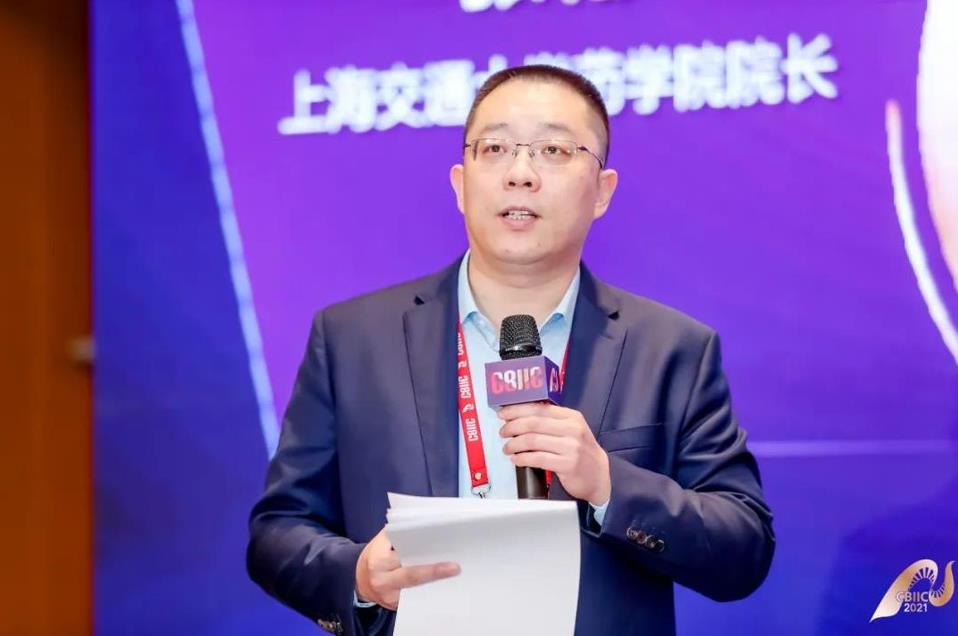
Moderator: Li Ming, CEO, ZSHK Laboratories Limited
Keynote Speech: Advances and Layout of Molecular Targeted Therapies
The opening speech was delivered by Zhang Ao, Dean of College of Pharmaceutical Sciences, Shanghai Jiao Tong University, titled with “Advances and Layout of Molecular Targeted Therapies”. First of all, Professor Zhang shared his experience on the research of molecular targeted drugs in the past decades. It brings new understanding of tumor from the perspective of signal molecular networks in cells, instead of a pure histomorphological level. Professor Zhang also mentioned the well attention to immunotherapy. With the advance of bio-pharmaceutical and medical field, tumor treatment is developing, with new generations of ideas and technologies emerging in a faster speed, and the survival time and treatment quality of tumor patients also improving. Professor Zhang presented research progress of popular targets and drugs in the fields of kinase, immune checkpoint and tumor metabolism, and held a positive view on the cooperation between China's academic institutes and the capital market.
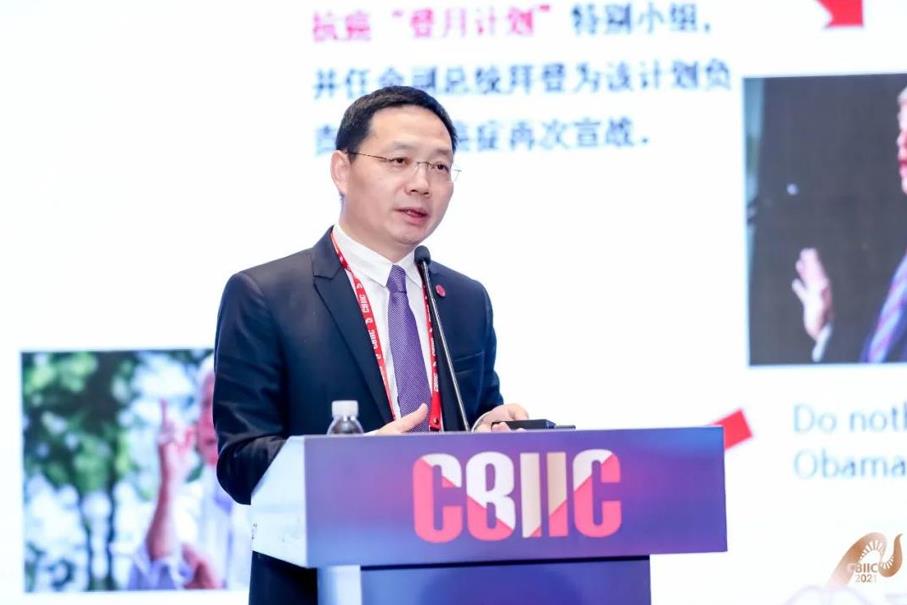
Zhang Ao, Dean of College of Pharmaceutical Sciences, Shanghai Jiao Tong University
Project 1: Guangzhou Bio-gene Leads the World in AML Cell Therapy
Ms. Luo Min, General Manager of Guangzhou Bio-gene Technology Co., Ltd., shared the clinical trial data of its CAR-T products in AML indications. According to its 2021 ASCO oral presentation, the CAR-T product has enter into phase II clinical trial in 2019, and has treated 11 children with refractory / recurrent AML, with an overall response rate (ORR) of 82% and a complete response rate (CR) of 73%. Its clinical results were widely discussed in the United States. By contrast, the CR of its marketed competitive products for refractory / recurrent AML (inhibitor of IDH1 and IDH2) remains only 20%-30%, with the average treatment time of only 3-4 months. For small molecule drugs (requiring regular administration), if a patient develops recurrence or intolerance, the administration must be be stopped, thus only a few months treatment. The CR of CD33-ADC antibody is only 20%, and the median PFS and 0S is 11.6 months, by comparison, 7 of the 11 patients treated by Guangzhou Bio-gene are still in the project.
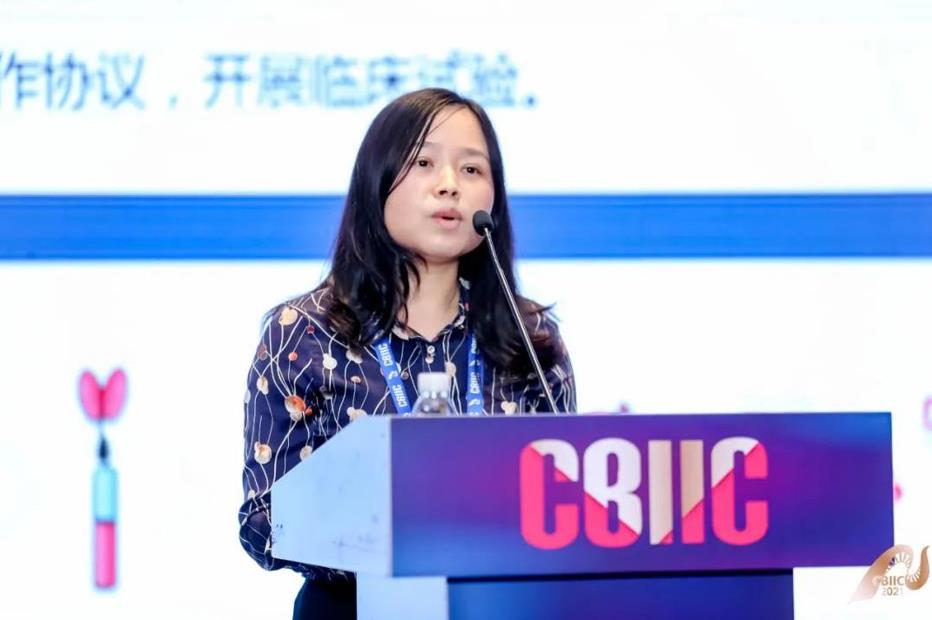
Luo Min, CEO, Guangzhou Bio-gene Technology Co., Ltd.
Project 2: Innovative Therapeutic Antihypertensive Vaccine
The second project on therapeutic vaccine, presented by Chen Xiao, Director of R&D of Wuhan Huajiyuan Biotechnology Development Co., Ltd., was a cutting-edge and novel treatment for hypertension. Compared with traditional antihypertensive drugs, hypertension vaccine has three advantages: first is the stable and long-term efficacy, which prevents patients from taking drugs orally repeatedly; the second is a simplified process for treatment, as immunotherapy has longer interval of administration; third, this therapy is based on GPCR regulation, a heated research issue in small molecule field. Beta—arrestinz, the major receptors in the human body, can be blocked completely by chemical drugs, but some of its functions are physiologically necessary. The company’s antibody regulation has the signal pathway on Beta—arrestinz, with no need to activate Ras feedback, which can not be achieved by chemical drugs at present. In addition, it is highly targeted and sensitive.
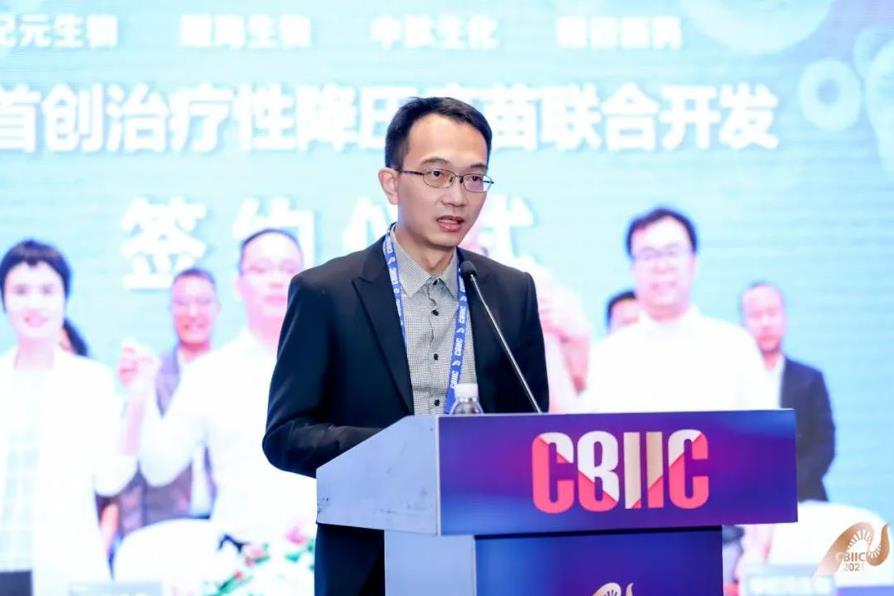
Chen Xiao, Director of R&D, Wuhan Huajiyuan Biotechnology Development Co., Ltd.
Project 3 : Immune Cell Therapy in the Future of Tumor Therapy
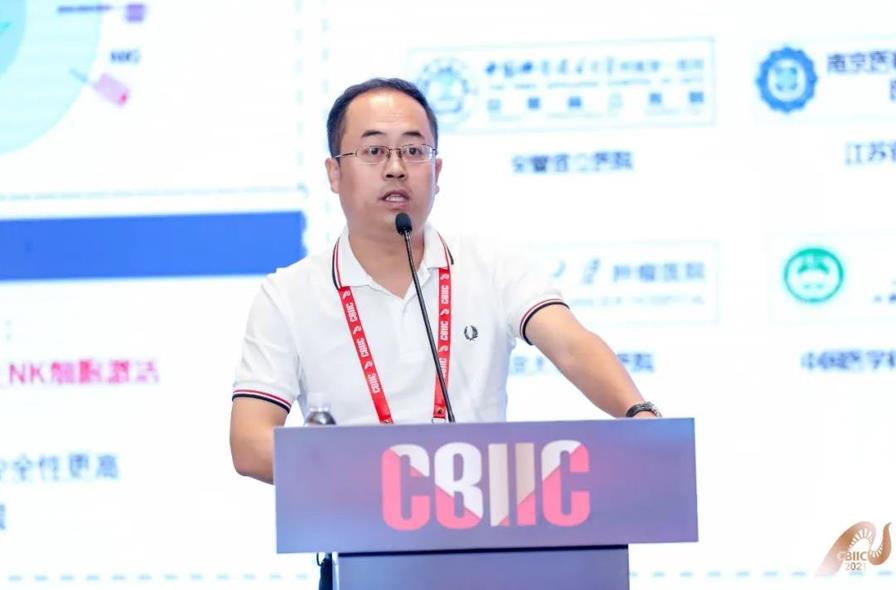
He Xiaohong, CEO, Nanjing Bioheng Biotech Co., Ltd.
Project 4: Development of FIC Immunoncology Bispefic Small Molecue and Muti-spefic Kinase Inhitor
Carl Xiao, VP of Tyligand Bioscience, introduced the company’s project. Tyligand Bioscience has 7-8 products in its pipeline, including star products TSN-084, namely CDK8/19 multi-specific inhibitor and TSN222 target small molecule tumor immune agonist. By using CD8/19 signaling pathway as the target, TSN-084 is studied in the dose-response relationship and indications. Mouse model test revealed good result in preclinical data. The company has submitted IND applications to the US FDA and China NMPA in September 2021, and can expect outstanding phase I clinical data in the near future. TSN222 aims to turn cold tumors into hot tumors by the sting pathway. The combination with PD-1, ADC and many other products is carried for better outcomes.

Carl Xiao, VP, Tyligand Bioscience
Project 5 : R&D and Industrialization of AAV Gene Therapy Products
Frontera Therapeutics is a biopharmaceutical company committed to the R&D and industrialization of AAV gene therapy products. Ms. Li Xinyan, President of Frontera Therapeutics, introduced the development and current situation of AAV in recent years, difficulties in developing and the unique technical advantages of the company. The company’s first product has entered in the IND stage at the end of 2020, and new products acquire IND every 3-6 months thereafter. All products of the company are aimed at patients with rare diseases, with huge market.
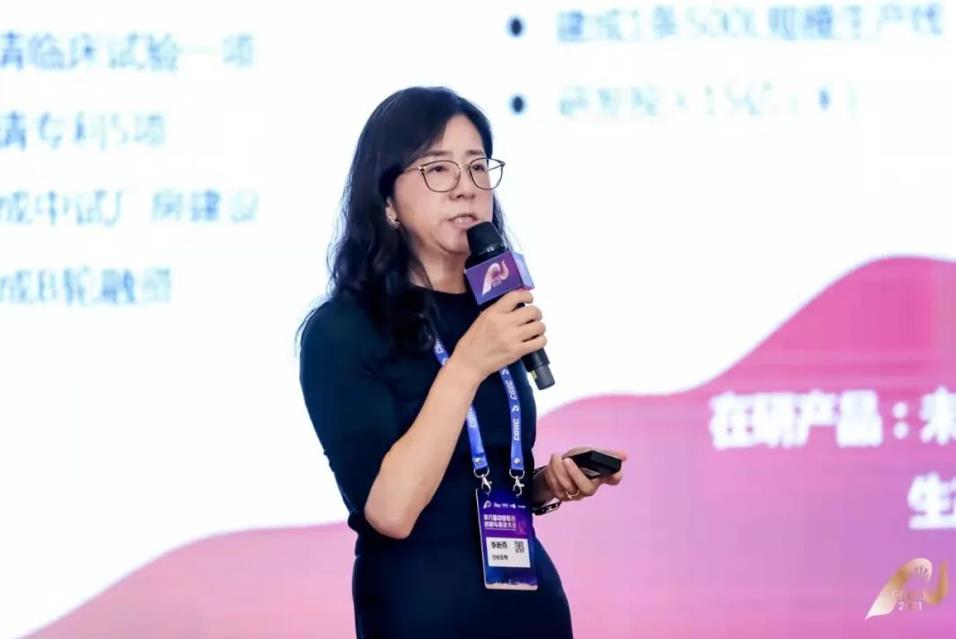
Li Xinyan, President, Frontera Therapeutics, INC.
Project 6: New Drug SR-01 against Ischemia-reperfusion Injury
Ms. Jiang Baohong, Professor of Shanghai Institute of Material Medica, presented a project on new drug against ischemia-reperfusion injury. The number of patients with cardiovascular disease is huge, especially in stroke incidence rate. The high mortality of stroke patients has brought a heavy burden to the society. Through model observation, its product SR-01 can significantly reduce infarct area, improve behavioral indicators, and protect blood vessels and nerves. The project has been supported by the National Key Project on Innovation and Development of Major New Drugs and the National Natural Science Foundation of China. It is hoped that the product will have excellent performance in clinical research.

Jiang Baohong, Professor, Shanghai Institute of Material Medica
Project 7: The 1.1 Class of Chemically Innovative Medicine of Antidepressant
There are 60 million patients with depression disorder in China, but a huge gap between the treatment rate with Europe and the United States, which lead to a huge market space. Mr. Huang Chenggang, Researcher of Shanghai Institute of Materia Medica, Chinese Academy of Sciences, introduced a new antidepressant class 1.1 drug. The drug is based on traditional Chinese medicine, with new mechanism and rapid effect. The drug acts on NMDA receptors, which avoid addiction problems. In addition, Mr. Huang also introduced his scientific research background and the financing plan of the project.
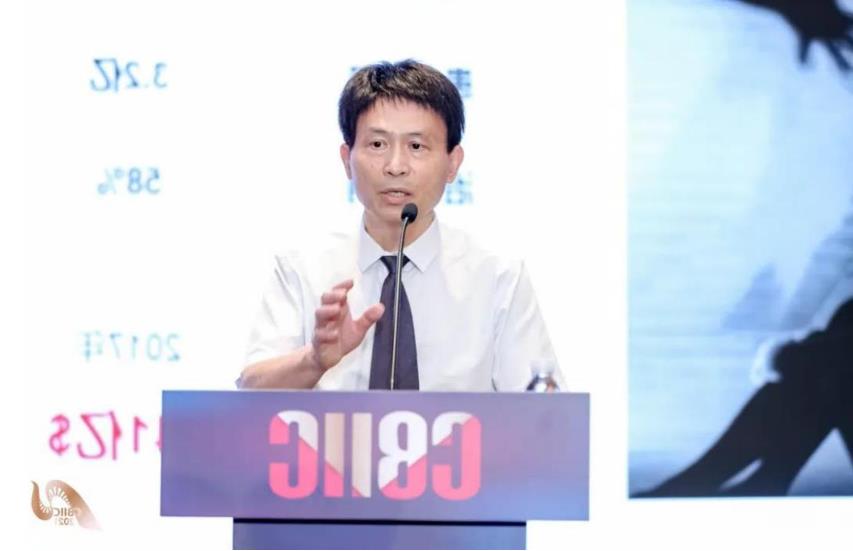
Huang Chenggang, Researcher, Shanghai Institute of Materia Medica, Chinese Academy of Sciences
Panel: Explore New Drugs - Chinese Model of Fundamental Research & Transformation
This discussion was chaired by Li Ming, CEO of ZSHK Laboratories Limited, joined by Zhang Ao, Dean of College of Pharmaceutical Sciences, Shanghai Jiao Tong University, Song Ruilin, Executive President of PhIRDA, Zhou Wenlai, Chief Biologist and Senior Vice President of Jacobio Pharmaceuticals Co., Ltd., and Tony Ye, Managing Partner of LYZZ Capital. The panelists discussed the implementation path of the transformation of basic research results from different angles.
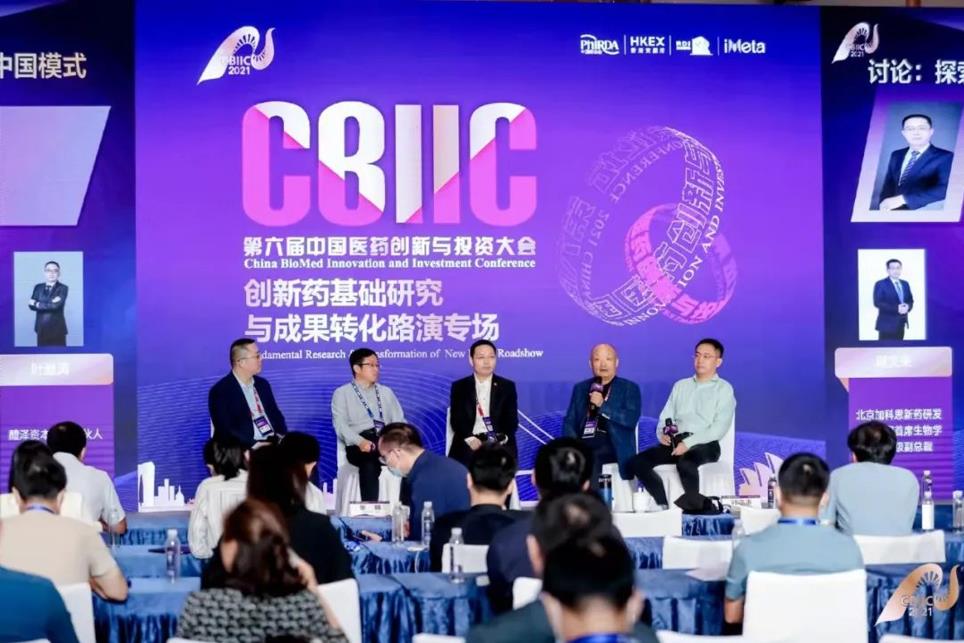
From left to right
Moderator: Li Ming
Panelists: Zhou Wenlai, Zhang Ao, Song Ruilin, Tony Ye
Song Ruilin, Executive President of PhIRDA, believed that China’s colleges and universities had decent academic research ability, but lacked of the innovation impetus, which can be improved by policies, so as to encourage researchers to devote themselves to basic research and achievement transformation, and create a good innovation atmosphere.
Zhang Ao, Dean of College of Pharmaceutical Sciences, Shanghai Jiao Tong University held the view that it was very difficult for the university to develop new drug projects, because a school is of teaching, but venture capital can have more contact with researchers, to promote the transformation of innovative drugs through cooperation.
From the perspective of entrepreneurs, Zhou Wenlai, Chief Biologist and Senior Vice President of Jacobio Pharmaceuticals Co., Ltd., thought that enterprises often need basic scientific research as support in R&D of innovative drug, and shared his working experience in Novartis. Mr. Zhou emphasized the importance of cooperation between academic institutions and enterprises.
From the perspective of capital, Tony Ye, Managing Partner of LYZZ Capital, pointed out that investors should not only work with scientific research and academia, but also bridge various resources, so as to make a leap forward from basic scientific research to achievement transformation.
Four panelists from the innovative drug industry shared their own experience, hoping that China will witness a brighter future of the basic research and more benefits for patients.
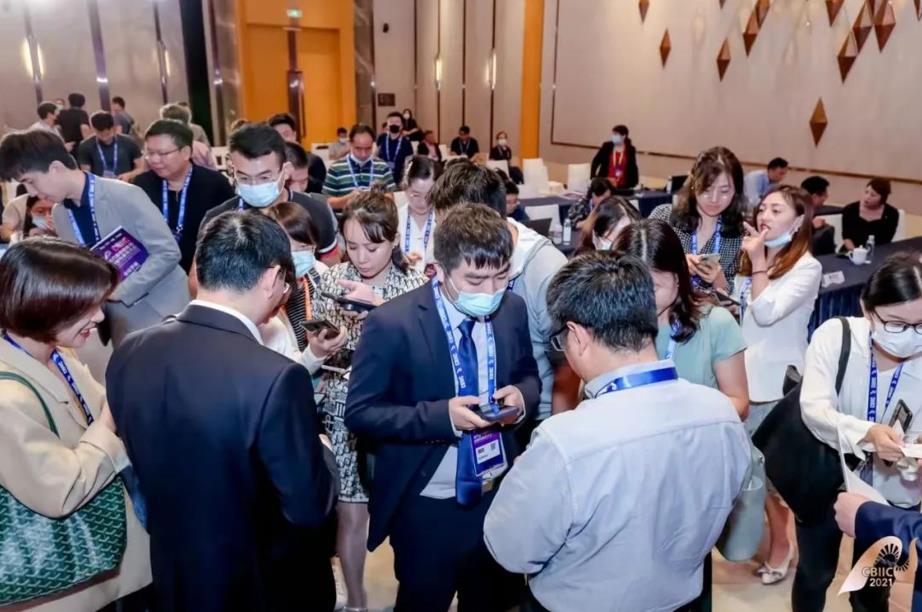
Fundamental Research & Transformation of New Drugs Roadshow

 News & Events
News & Events
 PHIRDA
PHIRDA  2026-01-19
2026-01-19
 57
57

 News & Events
News & Events
 PHIRDA
PHIRDA  2025-12-30
2025-12-30
 111
111

 News & Events
News & Events
 PHIRDA
PHIRDA  2025-12-22
2025-12-22
 149
149